
How to Manage a Distributed Remote Team Nov 23, 2024


How to Secure CRM Software and Ensure Data Privacy Sep 30, 2024



How NLP Can Transform Your Communication Skills Aug 27, 2024

Essential HVAC Maintenance for Rental Properties Aug 26, 2024

Maximizing Equipment Lifespan with CMMS Software Aug 08, 2024

Top Business Tools for Streamlining Your Operations Aug 01, 2024
Acid Turns Blood Cells into Stem Cells in 30 Minutes
Jan 30, 2014 19:23

Mining stem cells may not be an ethical quandary anymore. Scientists have successfully turned old blood cells into stem cells in just 30 minutes by dipping them in acid. The process is as simple as that.
The method was discovered by a bunch of Japanese scientists after observing a similar phenomenon in plants. Environmental stress can morph an ordinary cell into an immature one, and so new plants could then grow from the immature cell. That sort of process has been seen in birds and reptiles too, so the researchers from the Riken Center for Developmental biology set out to see if the same could happen with mammals.
The researchers experimented with mice, and sure enough, when they exposed blood cells from mice to acid, a transformation began. Some of the blood cells died, but many became stem cells within a couple of days.
"It looks a bit too good to be true, but the number of experts who have reviewed and checked this, I'm sure that it is," Chris Mason, professor of regenerative medicine at University College London, told the BBC. "If this works in people as well as it does in mice, it looks faster, cheaper and possibly safer than other cell reprogramming technologies—personalized reprogrammed cell therapies may now be viable."
This could be a game changer. The promise of stem cell research may herald the end of many diseases and the cure for many ailments. Of course, the whole thing is still unproven and complicated, but research is still underway.
The discovery could mean that we can produce stem cells cheaply, quicker and with less controversy behind it. No embryos would be harmed, and if it works in humans, the research on stem cells promise could accelerate faster than ever.
[New Scientist, BBC]

Let’s be honest; OTT platforms have completely changed our movie-watching experience and made entertainment just a click away. A few years ago, who would have thought that watching regional or international movies could be this easy, convenient, and tailored to our budget and preferences? And, yet here we are enjoying the options of Marathi, Malayalam, Hindi, Gujarati, Tamil movies, and a lot more at our fingertips. Read more

Electronic Logging Devices (ELDs) have revolutionized the trucking industry by streamlining logging practices and ensuring compliance with federal regulations. Designed to monitor a vehicle’s engine and automatically record driving hours, ELDs replace traditional paper logs and provide an efficient solution for tracking Hours of Service (HOS). If you're looking to complement your fleet's technology, partnering with tools like a reliable truck dispatch service can further optimize operations and keep your business running smoothly. Read more

The HONOR Magic 7 Pro price in ksa makes it an appealing option for those looking for a high-end smartphone. This advanced device stands out with its sleek design and robust build quality. This blog delves into the details, examining what makes the HONOR Magic 7 Pro unique, from the materials used to its overall durability and user experience. If you’re considering purchasing a high-end smartphone that balances aesthetics and functionality, this review of the HONOR Magic 7 Pro’s design and build quality will provide you with all the information you need. Read more
TECH NEWS
Jan 11, 2025 14:55
Copyright © Fooyoh.com. All rights reserved. User Agreement | Privacy Policy | Contact us
| Advertising
| About us
| Careers


















































